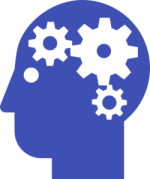Concentration Tips for eLearning Success

November 14, 2020
We’ve already spent nearly half of the school year learning from home, and it’s been a huge adjustment for parents, faculty, and students alike. Many students have struggled to adapt to this entirely new way of learning: all-day Zoom classes, working with at-home distractions, and experiencing a lack of interaction with teachers and peers. Sometimes it may even feel next to impossible for someone to complete homework while staying in his or her bedroom all day, coping with emotions brought forth by a global pandemic, and potentially not socializing with anyone outside the household.
However, there are existing strategies that are psychologically proven to improve concentration, productivity, and overall stress level while eLearning. The balance of attention and arousal — in psychology, this means energy — is the root of all of these study techniques, and understanding the dynamics of these factors is crucial to overcoming the challenges brought forth by learning online.
Dr. Andrew Kazama, a psychology professor and researcher at Emory University, explains that you’re able to best attend to what you’re doing when you have a medium level of arousal, because being too excited or too tired makes it difficult to focus on the task at hand. “You’re trying to strike the balance between enough external stimulus to keep your mind engaged, but not so much that it’s distracting,” notes Dr. Kazama.
This means that if there are too many distractions vying for students’ attention, moving to a place where there are less distractions, such as outside or to a quieter room in the house, will allow them to fully attend to their schoolwork. Similarly, Dr. Kazama adds, “We want music that increases our energy level but doesn’t distract us. So, a lot of EDM music is pretty good for that because it has a beat, is really repetitive, and you wouldn’t sing along to it or start dancing.” The ability to think deeply and concentrate is the product of minimizing distractions and a moderate level of energy.
Cell phones are another major source of distraction that, if eliminated, can be extremely impactful on productivity. In fact, studies have shown the farther away students’ phones are while they work, the better they perform cognitively. According to Dr. Kazama, humans are nowhere near as good at multitasking as we believe we are, and therefore it’s helpful to turn electronics off and put them outside the study space. The occasional scheduled technology check, however, is acceptable as connecting with others can be critical to strengthening mental health.
It’s nearly impossible for most people to do schoolwork on a screen for hours and not need a mental break, but some leisure activities restore focus better than others. According to the Attention Restoration Theory in psychology, concentrating on Zoom calls and assignments requires “hard focus,” and should be balanced with “soft focus” activities rather than other “hard focus” ones such as reading, surfing the internet, and watching television. Productivity is maximized when mental breaks are filled with activities like going on walks, meditating, or listening to music with your eyes closed because they reset your attention network and restore focus.
Dr. Kazama suggests clearly distinguishing between someone’s workspace and where he or she relaxes as another effective way to improve concentration. “Right now every day is like one long slog, and it wears you down over time,” he remarks. “Part of that may come from the fact we’re not compartmentalizing enough to say, ‘This is my workspace and this is where I’m going to sleep.’ If all of that is happening in one space, it’s difficult to focus on schoolwork or relax when you need to… If you don’t have a clean reset your ability to pay attention goes down.” Lighting different scented candles also helps people to compartmentalize.
Furthermore, “memory palaces” are a helpful strategy to study material more efficiently. This method entails picturing information in a certain meaningful layout, for instance envisioning pictures of key concepts in different rooms as the student walks around their house. In this sense, Dr. Kazama generally advises that making information applicable to oneself is the most effective strategy of memorization. “You start to draw parallels and make information relevant to you… It makes the content really sticky,” he notes.
These strategies may have little effect on study habits when academic success battles with extensive stress and pressure felt in these emotional times. In fact, chronic stress can kill cells in the hippocampus, which is the part of the brain responsible for memorization. To remedy this, Dr. Kazama suggests, “Make sure you’re safely getting as much offline socialization as you can… Anything you can do to connect with another human being emotionally is really helpful for your mental health.” He further offers that when people act with kindness and compassion it can help their own self-image and mental state. In conclusion, using the above solutions to improve concentration during eLearning as well as doing altruistic activities, such as tutoring, volunteering, and writing notes to loved ones to let them know they’re appreciated will ensure smarter, productive learning habits and enhance wellbeing overall.

